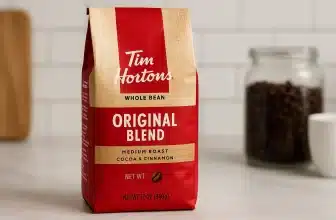
One Hundred Coffee is reader-supported, and some products displayed may earn us an affiliate commission. Details
Introduction: The Common Misconception
When people hear “decaf,” they often assume it’s completely caffeine-free. It’s a logical assumption—after all, “decaf” sounds like “no caffeine,” right? But the truth is a little more nuanced. Decaf coffee still contains a small amount of caffeine, and understanding what that means for your health and habits can help you make smarter coffee choices.
Who is this for?
Peet’s Decaf House Blend K-Cups are for Keurig users who love bold, full-bodied flavor without caffeine. Made from 100% Arabica beans, they offer a rich, smooth roast with no compromise on taste. Perfect for evening sipping or anyone seeking robust, decaffeinated coffee in a convenient single-serve pod format.
Price on AmazonHow Much Caffeine Is in Regular Coffee?
Appreciating how much caffeine is in decaf helps to understand what’s in a standard cup. A typical 8-ounce cup of brewed coffee contains:
- Drip coffee: 95–120 mg of caffeine
- Espresso (1 oz shot): 63 mg of caffeine
- Instant coffee: 60–80 mg of caffeine
- Cold brew: 100–200 mg per 8–12 oz serving (depending on concentration)
That’s a considerable dose—enough to wake you up, improve alertness, and potentially cause jitters or insomnia in sensitive individuals.
So, How Much Caffeine Is in Decaf Coffee?

Contrary to popular belief, decaf coffee is not 100% caffeine-free. The amount of caffeine in a typical 8-ounce cup of decaf coffee is:
- Decaf drip coffee: 2–5 mg of caffeine
- Decaf espresso shot: 1–3 mg
- Decaf instant coffee: 2–6 mg
These levels can vary slightly depending on the brand, decaffeination method, and brewing strength.
| Coffee Type | Average Caffeine (mg) |
|---|---|
| Regular Brewed Coffee | 95–120 |
| Decaf Brewed Coffee | 2–5 |
| Regular Espresso | 63 |
| Decaf Espresso | 1–3 |
| Instant Coffee | 60–80 |
| Decaf Instant | 2–6 |
Why Isn’t It 100% Caffeine-Free?
Removing caffeine from coffee is a tricky process. Caffeine is embedded deep within the cellular structure of the green coffee bean, making it difficult to remove entirely without compromising the flavor and structure of the bean. Most decaffeination methods remove 97% to 99.9% of caffeine, which is enough to significantly reduce stimulation effects, but not to eliminate caffeine.
Decaffeination Standards Around the World
Different countries have slightly different standards for what qualifies as “decaffeinated.”
- United States (FDA): Coffee must have 97% of caffeine removed.
- European Union: Coffee must be 99.9% caffeine-free based on green bean weight.
So, depending on where your beans come from, the caffeine content in decaf may be slightly lower or higher.
Who Should Be Concerned About Caffeine in Decaf?
For most people, the 2–5 mg of caffeine in decaf is negligible. But certain individuals may need to watch even small amounts:
- Pregnant individuals: Some health guidelines recommend limiting caffeine intake to 200 mg or less per day.
- People with caffeine sensitivity: Even small amounts of caffeine can cause palpitations, anxiety, or insomnia.
- Those with certain medical conditions, like acid reflux, insomnia, high blood pressure, or heart arrhythmias.
In such cases, it’s important to track even the small caffeine content in decaf, especially if consumed in multiple cups.
How Does Caffeine in Decaf Affect Your Body?

The small dose of caffeine in decaf is usually too little to produce noticeable stimulant effects. However, in very caffeine-sensitive individuals, even 2–5 mg can contribute to:
- A mild increase in alertness
- Disrupted sleep if consumed late in the evening
- Slight heart rate increase
But for most people, these effects are barely detectable.
Is There a Truly Caffeine-Free Coffee Option?
If you’re looking for absolutely zero caffeine, here are some alternatives:
- Caffeine-free herbal coffee substitutes made from roasted chicory, dandelion root, or barley
- Grain-based coffee alternatives like Pero, Cafix, or Teeccino
- Roasted date seed or fig beverages, offering coffee-like flavors without any caffeine
These options are entirely caffeine-free and can be brewed like regular coffee.
Tips for Minimizing Caffeine in Your Decaf
If you want the lowest possible caffeine content in your decaf, try these tips:
- Opt for Swiss Water Process decaf. This chemical-free method typically removes 99.9% of caffeine.
- Choose European brands. They often meet stricter standards for caffeine removal.
- Check labels carefully. Some brands list the exact caffeine content.
- Avoid decaf espresso late in the day. It can still contain a small, concentrated dose of caffeine.
Does Decaf Still Offer Coffee’s Benefits?
Yes! Decaf coffee still contains:
- Antioxidants like chlorogenic acid, which combat inflammation
- Essential minerals such as magnesium, potassium, and niacin
- Mental health benefits, including improved mood and cognition
Although slightly reduced compared to regular coffee, these compounds remain present after decaffeination, meaning you can still reap health perks without the caffeine buzz.
What About Decaf Tea?
The same principles apply to decaffeinated tea. It’s not entirely caffeine-free either:
- Decaf black/green tea: 2–5 mg per 8 oz
- Herbal tea: 0 mg (naturally caffeine-free)
So if you want to completely avoid caffeine, herbal teas like peppermint, chamomile, or rooibos are your safest bets.
Final Thoughts: The Verdict on Decaf and Caffeine
So, is decaf coffee truly caffeine-free? Technically, no. But for the vast majority of people, it’s “close enough” to serve as a safe, low-caffeine alternative. If you’re highly sensitive, pregnant, or managing a medical condition, it’s worth being mindful of even those small milligrams. Otherwise, decaf is an excellent option for enjoying coffee’s flavor and benefits without the jittery side effects.
Understanding what’s in your cup empowers you to make the best choice for your body, your preferences, and your lifestyle—caffeine and all.







